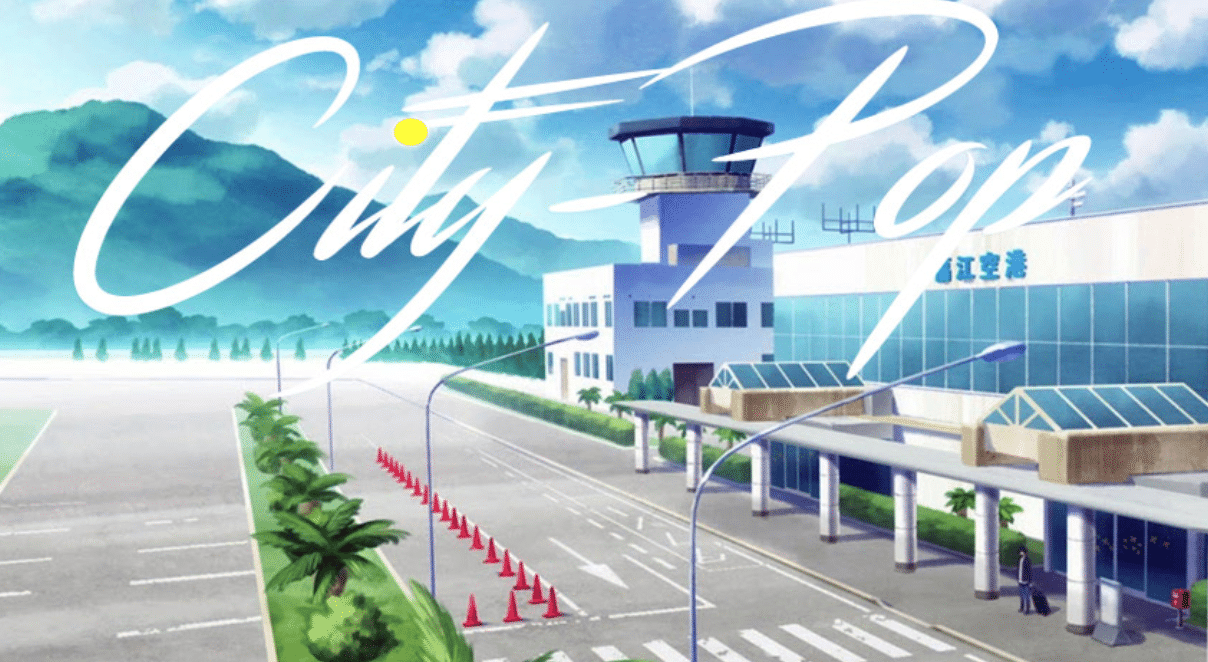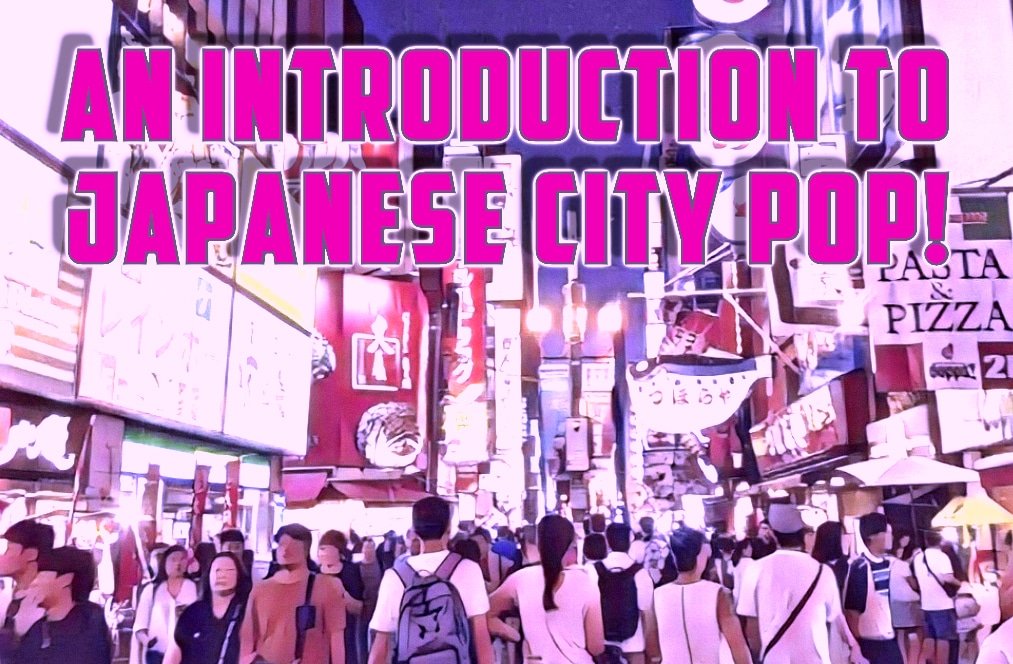As is probably apparent after spending a few minutes perusing the pages of Geek to Geek Media, our merry band of geeks and nerds possess an eclectic blend of tastes that we like to write and talk about. From video game blogs and tabletop reviews to podcasts dedicated to subjects such as K-Pop and Farming Simulator, our range of interests are varying and wide. Although it’s untypical for me to stray outside of my wheelhouse, namely, video games, lately I've felt inspired to present a brief primer on one of my favorite genres of music: Japanese city pop.
What is City Pop?

I hardly feel qualified to offer anything of merit on either the definition or history of ‘city pop,’ as this style of music has become known outside of Japan. Its resurgence in popularity during the past decade has resulted in several articles and YouTube videos discussing the precise meaning of the term. If you’re looking for somewhere to begin, I’d recommend A Brief History of City Pop for further context to the present discussion. While different commentators may diverge on how exactly they think the moniker ‘city pop’ is to be applied, or what specific musical styles really comprise the distinct sound that city pop contains, there do seem to be some points of general agreement.
City pop as it is now understood was, once upon a time, in the 1970s and 1980s, merely Japanese pop music. It was the soundtrack for a certain kind of urban lifestyle benefiting from Japan’s economic boom, bolstered by advancements in technology such as the introduction of the Sony Walkman. It incorporated numerous genres, from disco, funk, jazz, R&B, fusion, and beyond, and was heavily influenced by Western pop music of that era. Many of the commonly conceived city pop artists, such as Tatsuro Yamashita and Mariya Takeuchi, had grown up in a time period still fresh off of American occupation post-World War II.
Although the occupation officially concluded in 1952, its effects lingered on much longer in more ways than one (setting aside the global ubiquitousness of American pop culture, the U.S. maintains a military presence in Japan even today). This cosmopolitan spirit is evident in the multitude of songs that sprinkle English lyrics throughout their hooks and verses, despite very few Japanese people being fluent in English.
How I Came Into City Pop
I could go on but it’s not my intent to delay the impetus for this ‘Introduction.’ I’d rather let the music speak for itself. I’ll only add that my first encounter with city pop was back in 2019. I had just moved to Sapporo, the capital city of Japan’s northernmost main island, Hokkaido, and the country’s largest metropolis this side of Tokyo. Coincidentally, it was my sibling in the States who turned me on to city pop, stumbling on some artists through YouTube’s recommended feed. Hence, having just relocated to a sprawling Japanese city, and shortly thereafter meeting my wife, this genre of music, often associated with themes of romantic liaisons and inner-city pleasure-seeking, took on a more personal significance. It didn’t matter that my knowledge of Japanese was basically non-existent (it hasn’t improved nearly as much as I’d prefer in the intervening years). Music is truly a universal language.
Lastly, it didn’t occur to me until I began to write this article that some of these artists have exploded in popularity since my foray into city pop. The first song to appear in the following playlist, Mika Matsubara’s ‘Mayonaka no Door/Stay With Me,’ topped Spotify’s viral charts for 20 consecutive days after becoming a sensation on TikTok near the end of 2020. If you happened to miss out on that moment, as I did, or have never listened to city pop before, hopefully the handful of songs included below will expose you to a new sound that you’ll fall in love with as much as I have. Who knows, maybe one of them will inspire your next viral video?
Alright, then! Fire up those stereo systems or grab a pair of headphones, and let’s dive into some of my favorite city pop tunes!
Miki Matsubara – 真夜中のドア / Stay With Me
Released towards the end of 1979, just a few weeks shy of Miki Matsubara’s 20th birthday, ‘真夜中のドア (Mayonaka no Doa, or Midnight Door) / Stay With Me' was the lead single for Mastubara’s 1980 debut album, POCKET PARK. From its opening harmonies to Matsubara’s eminently catchy hook and the saxophone solo that follows the second chorus (i.e., the world’s sexiest instrument and also one featured prominently throughout this introduction), ‘Stay With Me’ is one of those songs that is bound to get stuck in your head for days and weeks, even years. Written as a plea to one’s lover— immediately recognizable by the coffee stain on their gray jacket—not to leave, the passion and angst in Matsubara’s voice still give me chills.
To put it another way, the soulfulness of her vocals, coupled with an impeccable backing arrangement and slick production, penetrates me to my core. I can’t also help but listen with a tincture of sadness. After largely retreating from the spotlight in the 1990s, Matsubara suspended her musical career completely in 2001 upon learning that she had developed cervical cancer. She died of the illness in 2004 at the young age of 44.
Junko Ohashi – テレフォン・ナンバー (Telephone Number)
Ah-ooooh! 5-6-7-0-9! So Hokkaido's very own Junko Ohashi croons on the chorus of ‘Telephone Number,’ a laid-back, groovy jingle originally featured on her 1981 album, Tea For Tears, and again on 1984’s Magical (with cover art displaying New York City’s iconic Manhattan skyline). ‘Telephone Number’ is a playful track imploring an acquaintance to remember Ohashi’s… telephone number (obviously), or at least five digits of it! Aside from Ohashi’s strong, soothing vocals and an overlay of exquisite harmonies, ‘Telephone Number’ is downright funky, boasting lush production, a delicate arrangement of brass instruments, and a bridge section in which saxophone once again takes center stage. In other words, it’s quintessential city pop music.
While not as active as she once was in the 70s and 80s, Ohashi has continued to drop the occasional album, her most recent being 2019’s Terra 3. She recorded and released it following treatment for both esophageal and breast cancer, which I can happily report that Ohashi appears to have successfully overcome.
Anri – 悲しみがとまらない / I Can’t Stop The Loneliness
I feel that there is little I can say to reinforce my affection for ‘悲しみがとまらない (Kanashimi ga Tomaranai) / I Can’t Stop The Loneliness,’ the second single off Anri’s 1983 album, Timely!! Actually, I can mention that the entire tracklist is insanely good, and I could have almost just as easily included the songs ‘SHYNESS BOY’ or ‘Remember Summer Days’ instead (you’ll find no shortage of city pop ballads dedicated to summertime nostalgia). However, I had to go with ‘I Can’t Stop The Loneliness.’ It’s not only my favorite among the present selection, it may very well be the greatest pop song ever written.
That’s debatable, sure, but its super snappy disco rhythm, unforgettable refrain, seraphic performance by Anri, and a killer horn section make it, at least for me, hard to top. And though its lyrics tell a sad tale about two friends falling for the same person, Anri apparently receiving the short end of the stick, it’s also one that makes me want to dance! In theory. In actuality, I can’t dance. At all. Regardless, loneliness has never felt so darn fine!
Anri remains active, having released her 26th album, ANRI, in 2018, and is currently scheduled to perform a string of concerts dates in the upcoming weeks. Here’s hoping she brings her live set up north!
Tatsuro Yamashita – Ride On Time
True story: A few weeks ago, on a cool autumn afternoon, I was returning home from work, sitting at a quiet train station located on the outer skirts of the city. I was jamming out to Tatsuro Yamashita’s ‘Ride On Time’ on my headphones as I waited for my train to arrive. Then, seemingly out of nowhere, there, in front of the platform, my train appeared. ‘Is it running early?’ I thought to myself, glancing down at the clock on my phone. Nope. It was ‘ride on time.’
Lame jokes aside, in reality, Yamashita’s jazzy number from his 1980 album of the same name isn’t a reference to Japan’s notoriously efficient public transportation. His lyrics, somewhat cryptic in meaning, generally seem to be about accepting the course of life’s flow. That there is a sense of self-liberation to be found in readily embracing whatever challenges each new day may bring, rather than attempting to struggle against it. Whatever the case may be, ‘Ride On Time’ has that signature city pop gloss. A bouncy beat? Check. Infectious bass lines which seem to automatically set one’s head to a bob? Got it. An unforgettable hook, and more of that sweet, sweet saxophone? Of course!
Yamashita has kept busy over the decades, and though not as prolific as he was during city pop's heyday, continues to regularly perform throughout Japan. Regrettably, the ongoing COVID-19 pandemic forced him to cancel his planned 2021 summer tour. I'm keeping my fingers crossed for next year!
Taeko Ohnuki – 4:00 AM
Growing up on artists such as The Mamas and the Papas and Carole King, Taeko Ohnuki met Tatsuro Yamashita in 1973, forming the short-lived group, Sugar Babe. She ventured out on a solo career only three years later, and in 1978 released her third studio album, Migonne (taken from the French word, ‘mignon,’ meaning ‘cute girl’). Migonne didn’t end up selling well at the time. However, it did spawn timeless classics like the inimitable ‘4:00 AM,’ an easy-going, chic ode to 11th-hour desperation. There is perhaps no song among those included here that exudes those ‘urban’ vibes with which city pop is so often associated as much as Ohnuki’s ‘4:00 AM.’ It’s yet another example of the excellence in songwriting, composition, and production that defines so much of the music within the genre, and which, in my view, doesn’t get credited enough.
Like the others I’ve mentioned, Ohnuki has never really left the music scene. To bring things full circle, i.e. back to my regular habit of video game-related writing, I must note that Ohnuki contributed vocals to a soundtrack featuring remixes from Nintendo’s Japan-only role-playing game, Mother 3. In addition, she also teamed up with the Big N for their 2006 theatrical release of Dōbutsu no Mori, or Animal Crossing: The Movie, singing the film’s official theme song. Nintendo declined to release that project outside of Japan as well.
Further Listening
If nothing else, I hope to have made one thing clear at this point: Japanese city pop is a gold mine. With countless artists and an almost endless barrage of well-written, quality pop songs, it was inevitable that I could only barely scratch the surface here. At the very least, if it's a genre that was previously unfamiliar to you, perhaps this brief introduction will have perked your interest. There is no shortage of city pop playlists available on outlets like Spotify and YouTube if you wish to seek out further tracks for your listening pleasure.
Or, maybe all of this was old news to you, and you have your own favorite city pop songs that you'd like to share? Did I fail to mention one that you think deserved the spotlight? Whether it was your first time hearing these tunes or the hundredth, I'd love to hear your thoughts on them! Drop a comment below, join the conversation on our Discord or Slack channels, or come say hello to us on Twitter!
Yoroshiku onegaishimasu!

